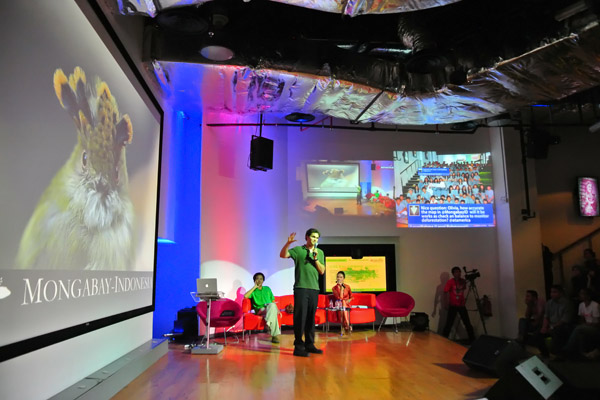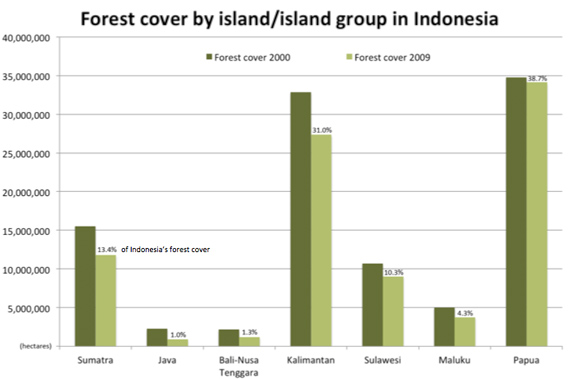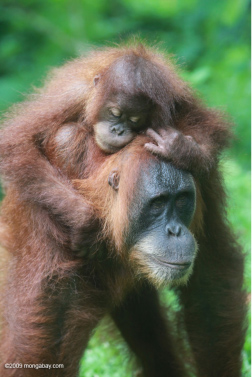Mongabay.com launches forest web site in Indonesian
Mongabay.com is pleased to announce the launch of Mongabay-Indonesia (mongabay.co.id), an environmental news web site published in Indonesian. The site was officially unveiled Saturday, May 19 at an event in Jakarta.
Mongabay-Indonesia is run independently of mongabay.com by a team of Indonesians based in three cities on the island of Java. The site will soon begin to build out a network of up to 50 corespondents across Indonesia. Mongabay-Indonesia will also have a weekly radio show on Green Radio FM.
Mongabay-Indonesia includes news and analysis on environmental issues within Indonesia, with a special focus on forests. There is a section about tropical forests and a unique deforestation alert tool developed in partnership with NASA and Cal State Monterey Bay. The tool reports changes in vegetation cover on a quarterly basis, which when combined with Mongabay-Indonesia’s network of local contributors, may offer the potential to investigate deforestation hotspots in Indonesia and other countries.
Below is the press release announcing the launch.

Mongabay.co.id launch event in Jakarta on May 19, 2012
Mongabay launches in Indonesian
INDONESIA has more plant and animal species than any country on Earth. Yet the ecosystems that support its biodiversity are being rapidly destroyed. Relatively few people are aware of this tragedy unfolding today. Mongabay.co.id aims to inform the public by providing the latest environmental news, information, and analysis, while at the same time highlighting Indonesia’s natural beauty.
“I believe people are less likely to destroy the environment if they know what they are losing,” said Rhett A Butler, founder and president of Mongabay.com in Jakarta, Saturday, May 19.
Indonesia is at a critical point in its development history. It has the opportunity to shift from a business-as-usual approach based on forest destruction toward a low carbon model that leverages the things that make Indonesia unique (biodiversity and culture), while improving the lives of all Indonesians. Indonesia already has a model: Brazil has seen its deforestation rate fall by nearly 80 percent since 2004, while its economy has surged by about 40 percent. “There’s no reason Indonesia can’t do the same,” said Butler.
Over the past two decades Indonesia lost more than 24 million hectares of forest, an area larger than the U.K. As forests fell, billions of tons of carbon were released into the atmosphere and Indonesia’s flora and fauna—the most diverse of any country—was further imperiled.
But today Indonesia is poised to halt, and possibly even reverse, this trend. The country’s Reducing Emissions from Deforestation and Degradation (REDD+) program offers the potential to alter the status quo in Indonesia, converting its economy from one based on wanton forest destruction to one based on low carbon growth.

|
To start this process, Indonesia has launched a pilot project in Central Kalimantan, a province that is presently experiencing one of the highest rates of conversion in the country. The province is also beset by social conflict and corruption, as evidenced by last year’s audit by the anti-corruption board which found more than 92 percent of plantation and mining companies operating in Central Kalimantan had failed to secure the proper permits. The cost to the Indonesian state is estimated at $17.6 billion over the past 15 years.
The Central Kalimantan findings demonstrate the need to build transparency and strengthen civil society within Indonesia. One component for doing so is improving on-the-ground information gathering and reporting. Given Indonesia’s widespread Internet use—including among the highest per capita participation in Facebook and Twitter—independent online media is an ideal opportunity to help civil society, the government, and the media better understand what is driving deforestation and opportunities for mitigating it. On-the-ground monitoring and reporting—especially in the pilot province of Central Kalimantan—will be critical to making REDD and other efforts to reduce deforestation as well as corruption a success.
Mongabay.com has emerged over the past 12 years as one of the top sources of tropical forest news, analysis, and information on the Internet. The site today draws more than two million visitors per month, making it among the most visited eco-focused destinations on the Internet. In 2008, Mongabay.com was honored by Time Magazine as one of the 15 best “green” sites on the Web. In 2010, it was nominated for the Climate Change Communicator of the Year Award by George Mason University. Mongabay.com has been financed via advertising revenue since 2003.
Given this critical moment in Indonesia’s path toward a low carbon development model through better forest stewardship, now is the time to launch a comprehensive environmental news and analysis Web site in Indonesian. “With its established reputation and strong following, mongabay.com could be an ideal platform for such an initiative, supporting efforts to inform and strengthen civil society,” Butler said.

|
Mongabay-Indonesia coordinator Ridzki R. Sigit said the Indonesian website is aimed to raise more public awareness about Indonesia’s biological diversity and the challenges to preserve it.
“We would like to see more people do understand the challenges. We expect Mongabay.co.id will find a space in Indonesia.”
According to Sigit, Mongabay.co.id will cover various environmental stories, including forests, oceans, farming and sustainable development, wildlife, as well as environmental protection. It will also provide information on practices which threaten the environment and exclusive reports.
Mongabay.co.id will also help boost transparency with a deforestation tracking tool. The tool, developed through Mongabay.com’s partnership with NASA and Cal State Monterey Bay, allows users to see where deforestation has occurred anywhere in the world during the previous three months.
“The deforestation alert tool will create unprecedented transparency around forests in Indonesia,” said Butler. “Mongabay.co.id’s network of correspondents across Indonesia will be able to investigate deforestation hotspots when they appear on the map.”
“We hope to eventually add an alert system so users can be notified of deforestation in a given area as it is detected,” he added.
Mongabay.co.id will operate on the social media sphere, using Mongabay-Indonesia on Facebook, @mongabayID on Twitter, and a SMS-platform for distributing stories. Mongabay.co.id will also have a weekly radio show on Green Radio FM.














